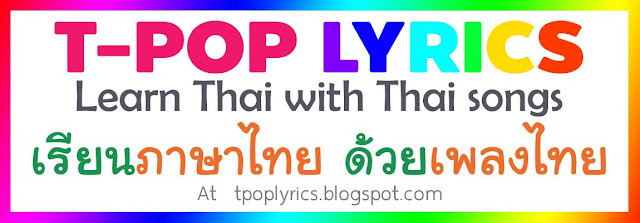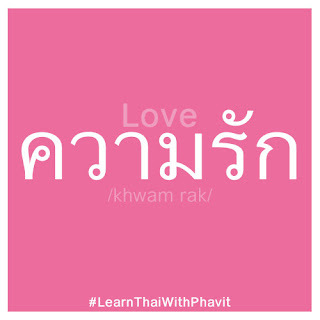Thai Grammar หลักไวยากรณ์ภาษาไทย
SENTENCE STRUCTURE
Thai Sentence Structure is similar to English. Thai syntax conforms to SUBJECT-VERB-OBJECT word order.
ฉันกินข้าว
/chǎn kin khâo/
I eat rice.
/chǎn kin khâo/
I eat rice.
ฉันอ่านหนังสือ
/chǎn àn nǎngsǔe/
I read a book.
NEGATIVE SENTENCE
In Thai, a negative sentence is made by using a negative words, such as ไม่ /mai/, ไม่ได้ /mai dai/, ไม่ใช่ /mai chai/
POSITIVE SENTENCE
ฉันมีเงิน
/chǎn mi ngoen/
I have money.
NEGATIVE SENTENCE
ฉันไม่มีเงิน
/chǎn mâi mi ngoen/
I don't have money.
POSITIVE SENTENCE
ฉันกินข้าว
/chǎn kin khâo/
I eat rice.
NEGATIVE SENTENCE
ฉันไม่ได้กินข้าว
/chǎn mâi dâi kin khâo/
I didn't eat rice.
THAI PRONOUNS
Knowing many Thai pronouns can make you speak more naturally.
For anyone who don't know about Thai pronouns yet, please CLICK HERE.
For anyone who don't know about Thai pronouns yet, please CLICK HERE.
VERB (TO BE)
Please CLICK HERE for learning about how to say TO BE in Thai.
THAI ADJECTIVE
This can be a new exciting thing for anybody who learns Thai. After you learnt how to place Thai adjective in a sentence, you'll be able to speak various kind of sentence.
เขาเป็นคนรวย
/khǎo pen khon ruai/
He is a rich man.
PAST TENSE
เขาเป็นคนรวย
/khǎo pen khon ruai/
He is a rich man.
TENSE
PAST TENSE
In Thai, we has no past tense. So, we use a TIME WORD for indicating it.
เมื่อวานฉันไม่ได้ไปโรงเรียน
/mûeawan chǎn mâi dâi pai rongrian/
I didn't go to school yesterday.
PRESENT CONTINUOUS TENSE
If you want to say that you're doing something, you have to use the word กำลัง /kamlang/ + a verb.
ฉันกำลังกินข้าว
/chǎn kamlang kin khâo/
I am eating rice.
FUTURE TENSE
We use the word จะ /cha/ for indicating your willing to do something in the future.
ผมจะไปเที่ยวลอนดอนพรุ่งนี้
/phǒm chà pai thîao london phrûngní/
I am going to go to London tomorrow.
เมื่อวานฉันไม่ได้ไปโรงเรียน
/mûeawan chǎn mâi dâi pai rongrian/
I didn't go to school yesterday.
PRESENT CONTINUOUS TENSE
If you want to say that you're doing something, you have to use the word กำลัง /kamlang/ + a verb.
ฉันกำลังกินข้าว
/chǎn kamlang kin khâo/
I am eating rice.
FUTURE TENSE
We use the word จะ /cha/ for indicating your willing to do something in the future.
ผมจะไปเที่ยวลอนดอนพรุ่งนี้
/phǒm chà pai thîao london phrûngní/
I am going to go to London tomorrow.
 |
| CLICK HERE! |




Comments
Post a Comment